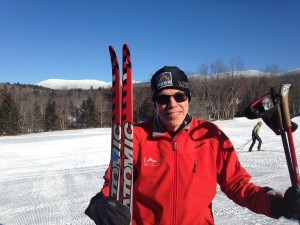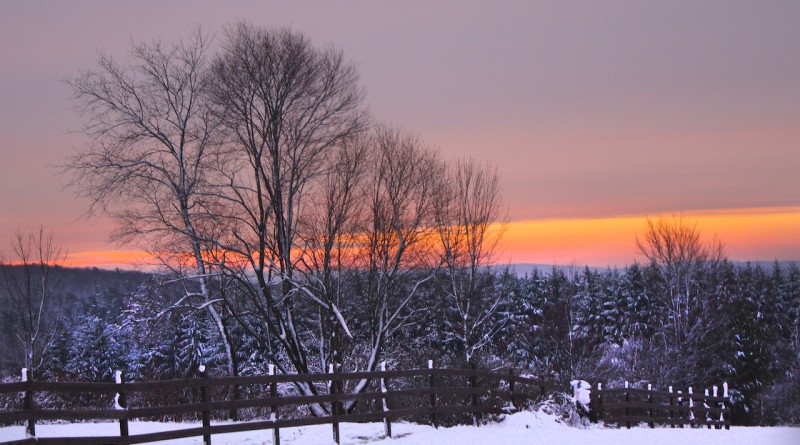Bill McKibben’s Long Range Forecast
Climate change activist, author, and Nordic skier Bill McKibben weighs in on the future of winter in Vermont.

In 1986, Bill McKibben, then 26, left his job as staff writer at The New Yorker and moved to the Adirondacks to write the seminal book on climate change, The End of Nature. At 37, he took a year to train as an Olympic Nordic skier might and wrote Long Distance: A Year of Living Strenuously, a book that Into the Wild author Jon Krakauer called “a wonderful paen to winter.” McKibben has since written numerous books, including Deep Economy, Hundred Dollar Holiday, Maybe One and, most recently, Oil and Honey. Now 55 and a scholar-in-residence at Middlebury College, McKibben is the founder of the climate change activism group 350.org and a world leader in raising awareness of the human impacts on climate change. He and his wife, author Sue Halpern, live in Ripton and teach at Middlebury College.
You’re an avid skier, but not really a chairlift type of guy. Where might we run into you skiing?
Whenever I’m home I try to ski, usually at Middlebury College’s Rikert Cross Country Center in Ripton. Since they put in snowmaking in 2013, Rikert has a 5K course you could host the Olympics on tomorrow; it may be the best race trail in America. Beyond that, you can ski from here to Lincoln or Goshen on a combination of groomed and backcountry trails like the Catamount Trail. The Goshen-Ripton-Lincoln plateau, the country between Stowe and Bolton, and Craftsbury, Vermont may be the three best nodes in the state—though of course there’s an awful lot of great Nordic skiing here.
How did training like an Olympian, as you wrote Long Distance, change you?
It was nice to take a year off from failing to save the planet to learn about my body and what real Nordic racers go through. I’ve always been disciplined, but I really learned how you have to tune your body to eat right and to train right. I’ve managed to pretty much stay in shape since then—never fast, always dogged.
Early winter was not good to Vermont. Another sign of climate change?
My mood is really dependent on the weather, not just locally, but globally. This past Christmas was the first year it was above freezing at the North Pole; there were floods in Mississippi and hurricanes in Iceland. Globally, 2015 looks to be the hottest year on record. El Nino made it worse for Vermont this year but we are already measuring the impacts of climate change here with shorter, milder winters. A good, objective gauge? The contests that have gone on for decades to see when ice melts on ponds and lakes around the state are noting the ice thaws much earlier each year.
Tell us about 350.org, the organization you and Middlebury College students founded that promotes bringing the planet’s C02 levels down from the current 400 parts per million to 350 ppm, the level many scientists believe is the limit for sustaining life as we know it.
The first real climate change protest started here in Vermont in 2006 with a march from Ripton to Burlington that I helped organize with friends, Middlebury College students and, by the way, Bernie Sanders. It drew a thousand people. In September 2014, more than 400,000 people turned out for the People’s Climate Change March in New York. So that’s good growth, I guess. Recently, we’ve been successful in helping block the Keystone XL pipeline and in 2015, we saw divestment in fossil fuels increase 50-fold to reach $3.6 trillion. This January, Governor Shumlin asked the Vermont legislature to divest the state’s stock in Exxon, which may be the next big front in this fight.
You wrote in The New York Times that the climate change talks in Paris last December fell short. Why?
Over this century, we’ve already warmed the planet by 1 degree C (or 1.8 degrees F) and that’s been enough to start polar ice caps melting. But in Paris, though the rhetoric was pretty good, the actual pledges that countries made would put us on on path for a 6- to 8-degree F warm-up. If that happens, we’re not going to be talking about just losing snow and skiing, we’ll be talking about a lot worse things happening: floods, tick and mosquito infestations, crop failures, drought and more.
Is there any good news for skiing and for Vermont?
Vermont ski areas have become very good at dealing with climate change: we have some of the best snowmaking in the country. As for natural snow, in the short term we are going to see some strange weather patterns, like a dip in the polar vortexes, that could bring more cold to the state. But overall, we’re going to see shorter and warmer winters. That’s why I never take a snowstorm for granted. If it snows, I’m out there. n

